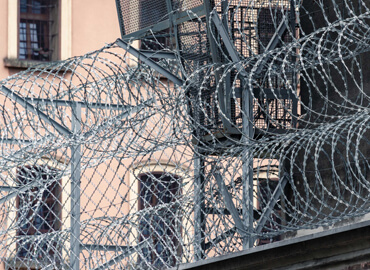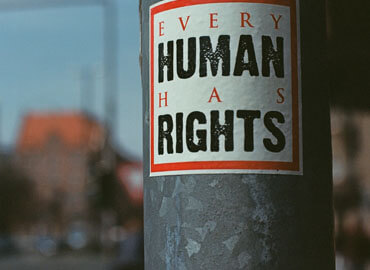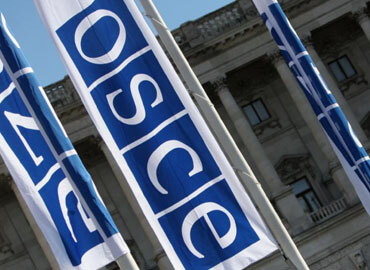Why the role of the International Criminal Court for ensuring accountability in Belarus is important?
There are reasonable grounds to believe that, at least since June 2020, the Belarusian Lukashenka regime perpetrated the crimes against humanity against Belarusians. More than three years after the start of the ongoing wave of unprecedented repression against hundreds of thousands of Belarusians, there has been no progress in bringing perpetrators to justice. Instead of investigating and prosecuting those crimes, current de facto Belarusian leadership praised the brutal response of law-enforcement officials to the peaceful protests. Investigation of cases from Belarus submitted on the basis of the universal jurisdiction principle to national law enforcement bodies in several European countries has stumbled and faces various legal and procedural obstacles. Establishment of an international Special Tribunal for Belarus, the most comprehensive mechanism that could indict a large number of perpetrators, may take considerable time.
Justice for the victims of crimes in Belarus has not been delivered. Impunity continues to prevail, encouraging the de-facto authorities to continue and intensify their repressive policies and commit new crimes. The people of Belarus and those who support them deal with an accountability gap.
The overall situation of impunity, given the status of crimes against humanity in international law and in collective conscience of humankind, necessitates the decisive response on the part of international community. We believe that it is worthwhile to turn to a mechanism that at the first glance may appear not relevant to the situation in Belarus, the International Criminal Court. However, as we argue in this paper, this is not the case, and the Court may play an important role in ensuring justice for people of Belarus. This view is shared by a number of partners. Action by State parties to the Rome Statute is what is urgently needed now.
Preamble of the Rome Statute of the International Criminal Court refers to the determination of the States Parties to the Rome Statute “to put an end to impunity for the perpetrators” of “the most serious crimes of concern to the international community”, such as the crimes against humanity. States Parties should use their rights under the Rome Statute accordingly and refer the situation in Belarus, where the crimes are ongoing, to the Prosecutor of the International Criminal Court in The Hague.
How to engage the jurisdiction of the International Criminal Court for Belarus
The jurisdiction of the International Criminal Court (“the Court”) is mostly based on two grounds: territorial and national. It follows, that the Court may exercise jurisdiction if “[t]he State on the territory of which the conduct in question occurred”[1], or “[t]he State of which the person accused of the crime is a national”[2] is the State Party to the Rome Statute (“the Statute”). Republic of Belarus is not a State Party.
The Statute provides for two additional paths towards the Court obtaining jurisdiction: acceptance of the exercise of the Court’s jurisdiction by the territorial State which is not a State Party to the Statute through the declaration lodged with the Registrar of the Court,[3] and referral of the situation by the United Nations Security Council acting under chapter VII of the Charter.[4] Both options are not available, at least until Mr Lukashenka is in power in Belarus, and his close ally Mr Putin controls the Russian veto power in the Security Council.
There is, however, a back door which flows from the recent jurisprudence of the Court and which might be open for Belarus.
In 2018, the Court’s Pre-Trial Chamber ruled on the request of the Prosecutor lodged by her pursuant to Article 19 § 3 of the Statute[5] which entitles the Prosecutor to “seek a ruling from the Court regarding a question of jurisdiction or admissibility”.[6] The Prosecutor inquired whether the Court may exercise jurisdiction over the alleged deportation of the Rohingya people from Myanmar (non-State Party to the Statute) to Bangladesh (State Party to the Statute).
The crime against humanity of deportation proscribed by Article 7 § 1 (d) of the Statute is committed when the perpetrator forcibly (that may include threat of force or coercion) displaced persons who lawfully resided in the area to another State.[7] The Court has held “that deportation… is an open-conduct crime”, i.e. “the perpetrator may commit several different conducts which can amount to ‘expulsion or other coercive acts’, so as to force the victim to leave the area where he or she is lawfully present”.[8] It follows, that, in order to prove the crime of deportation, “the Prosecutor has to prove that one or more acts that the perpetrator has performed produced the effect to deport… the victim”.[9]
The Pre-Trial Chamber found that the Court has jurisdiction under the Statute “if at least one legal element of a crime within the jurisdiction of the Court or part of such a crime is committed on the territory of a State Party [to the Statute]”.[10] The Chamber emphasized “the inherently transboundary nature of the crime of deportation”[11] given that “an element of the crime of deportation is forced displacement across international borders, which means that the conduct related to this crime necessarily takes place on the territories of at least two States”.[12]
The Chamber further held that the Court in this trans-boundary context might have jurisdiction over the crime against humanity of persecution proscribed by Article 7 § 1 (h) of the Statute if it is established “that members of the Rohingya people were deported from Myanmar to Bangladesh on any of the grounds”[13] listed in that sub-paragraph, namely “political, racial, national, ethnic, cultural, religious, gender, or other grounds that are universally recognized as impermissible under international law”.[14]
In 2019, another Pre-Trial Chamber of the Court authorized the Prosecutor’s investigation in Bangladesh / Myanmar.[15] The Chamber held, that “[t]he alleged deportation of civilians [the Rohingya] across the Myanmar-Bangladesh border, which involved victims crossing that border, clearly establishe[d] a territorial link on the basis of the actus reus[16] of this crime (i.e. the crossing into Bangladesh by the victims)”.[17] The Chamber went on to authorize “the commencement of the investigation in relation to any crime within the jurisdiction of the Court committed at least in part on the territory of Bangladesh, or on the territory of any other State Party [to the Statute] or State making a declaration under article 12(3) of the Statute [accepting the exercise of the Court’s jurisdiction], if the alleged crime is sufficiently linked to the situation”[18] of the Rohingya.
It follows that the Rohingya case-law of the Court, confirmed by unanimous decisions rendered by two differently composed chambers of the Court, allows the Court to assert jurisdiction over the crimes against humanity in Belarus when there is a territorial link of the actus reus (objective element) of the crime with the State Party or the States Parties to the Statute, or States accepting the exercise of the Court’s jurisdiction under Article 12 § 3 of the Statute, such as crossing of the international border by the victims from Belarus to the neighboring States, including Poland, Lithuania, Latvia, and Ukraine, the first three States being Parties to the Statute, and the latter having accepted the exercise of the Court’s jurisdiction under Article 12 § 3 of the Statute.
This logic is fully admissible on the basis of both applicable law and established facts in so far as the situation in Belarus since 2020 is concerned.
States Parties to the Statute should make use of their powers to refer the situation in Poland, Lithuania, Latvia, and Ukraine/Belarus to the Prosecutor of the Court under Article 14 of the Statute.
Crimes against humanity in Belarus: contextual elements
According to the Statute, all crimes against humanity have indispensable contextual elements, namely they are to be committed a) “as part of a widespread or systematic attack directed against any civilian population”,[19] and b) “pursuant to or in furtherance of a State or organizational policy to commit such attack”.[20]
“’Attack directed against a civilian population’… is understood to mean a course of conduct involving the multiple commission”[21] of crimes against humanity. The term “widespread” “connotes the large-scale nature of the attack, which should be massive, frequent, carried out collectively with considerable seriousness and directed against a multiplicity of victims”.[22] The “systematic” character of the attack “refers to the existence of ‘patterns of crimes’ reflected in the non-accidental repetition of similar criminal conduct on a regular basis”.[23]
In so far as the “policy” is concerned, this contextual element “refers essentially to the fact that a State or organisation intends to carry out an attack against a civilian population”;[24] the existence of such policy can be inferred through “repeated actions occurring according to a same sequence”.[25] However, this policy may “become clear to the perpetrators, as regards its modalities, only in the course of its implementation, such that definition of the overall policy is possible only in retrospect”.[26]
A comprehensive report[27] recently published by the Vilnius-based Law and Democracy Centre contains helpful assessment of available evidence of the commission of crimes against humanity in Belarus since 2020. Earlier analysis was accomplished by four civil society groups – International Partnership for Human Rights, Global Diligence, Truth Hounds, and Norwegian Helsinki Committee – in their joint communication[28] submitted in 2021 to the Prosecutor of the Court. The investigation mandated by the United Nations Human Rights Council also opined that “[s]ome of the [human rights] violations [in Belarus] may also amount to crimes against humanity”.[29]
When considering the existence of an “attack directed against a civilian population”, the reports suggest that “[t]he Lukashenko regime has been engaged in a course of conduct including the commission of” the crimes against humanity “in various locations across Belarus”.[30] “[T]he regime’s use and threat of violence, arbitrary arrest and other forms of coercion have resulted in the crimes [against humanity] of deportation and persecution”.[31] In the course of this attack which started in the summer of 2020 “the Belarusian authorities have targeted a broad collective of individuals, which includes any and all civilians actually, or perceived to be, supportive of Lukashenko’s political opponents”.[32]
The attack is both widespread and systematic. According to the reports, police violence against anti-government protests “took place all across the country, including the capital, Minsk, but also Brest, Hrodna, Homel, Bobruisk, Zhodino and others”.[33] Further, it is asserted that “torture, sexual violence and arbitrary deprivation of liberty have been committed in all regional and practically in all district centers of Belarus”.[34] According to the most recent comprehensive estimates, the number of victims of crimes against humanity in Belarus since May 2020 “exceeds 136,000 people, with 10 people killed, about 1,500 persons imprisoned as political prisoners, over 35,000 people arbitrarily detained, and more than 100,000 Belarusians forced to flee the country”.[35] The systematic nature of the attack is confirmed by the fact that the assaults against civilians in Belarus “were massive and carried out with considerable coordination and seriousness”, that they were “marked by their sophisticated organization”, and that “[t]he same pattern of behavior [was] repeated methodically week after week”.[36] The United Nations monitors report, that “the organized nature of the violations renders it improbable that they were random and accidental”.[37]
In so far as the “policy” contextual element is concerned, the narrative is clear: “an authoritarian ruler and his government, fearful of an election loss after many years in power, have brutally deployed the mechanisms of state power to crush a vocal opposition”; [the Lukashenko regime is an organized body of individuals with a brutally simple common purpose: retaining power”,[38] they intend to commit grave crimes against Belarusians in order to drive them into submission.
The Belarusian authorities’ modus operandi was illustrated by the leaked recording of the chief of the Main Directorate for Combating Organized Crime and Corruption at the Belarusian Ministry of Interior, the notorious unit well known for its central role in repression, speaking to his subordinates: “Just injure [the average protester] in some way: either cripple him, mutilate him, or kill him. Use your weapon [to shoot] right in the forehead, right in the face, right to the point of no return to the condition he was beforehand. If [other protesters] resuscitate him, alright then. He’ll be missing half his brain, well, good riddance… These are superfluous people in our country”.[39]
There is therefore a good case to establish contextual elements of the crimes against humanity committed in Belarus since 2020.
Crime against humanity of persecution
Crime against humanity of persecution, punishable under Article 7 § 1 (g) of the Statute, “means the intentional and severe deprivation of fundamental rights contrary to international law by reason of the identity of the group or collectivity”.[40] “The conduct constituting persecution must have been committed in connection with any other crime within the jurisdiction of the Court (connection requirement)”.[41] The persecutory conduct must be directed against an identifiable group on, inter alia, political grounds “that do not pertain only to the victim’s membership of a political party or adherence to a particular ideology but also to differences of opinion over public affairs, or (actual or presumed) political affiliations”,[42] “as defined by the perpetrator”.[43]
In the situation of Belarus since summer 2020, there was “the intentional and severe deprivation of fundamental rights contrary to international law, by reason of the victims’ actual or perceived opposition to the [Lukashenka] regime”.[44] The serious breaches of fundamental human rights of “the critics and opponents of the [Lukashenka] regime over the course of months of protesting in Belarus – use of force against peaceful protestors; killing and enforced disappearance; unlawful/arbitrary detention; torture and serious ill treatment, including the denial of medical assistance; denial of due process; denial of other fundamental rights and harassment – amount to severe deprivations of fundamental rights”, such as “the right to life; the right not to be subjected to torture or cruel, inhuman, or degrading treatment; freedom of expression; freedom of assembly and association; the right to due process and the right to private and family life”, “contrary to international law”.[45]
The crime of persecution was linked to the crime of deportation: “the deportee victims fled Belarus for no other reason that violent and sustained targeting and the coercive environment created [in Belarus] by the [Lukashenka] regime”,[46] in other words, “[t]hose who fled [Belarus] across international borders did so in response to the [Lukashenka] regime’s persecution”.[47] The United Nations Human Rights Council Special Rapporteur on the situation of human rights in Belarus (“the United Nations Special Rapporteur”) underlined in her most recent report the continuing persecution of journalists, bloggers, and other media workers, leaders and members of independent trade unions, human rights defenders, civil society activists, academics, lawyers, and other independent professionals.[48]
The discriminatory intent of State-driven persecution of opposition-minded persons in Belarus is proven by the recent legislative amendments. In particular, in 2021 the Belarusian authorities amended and broadened “anti-extremist” legislation effectively criminalizing “almost any legitimate activity under human rights law”.[49] Prima facie case of persecution in contemporary Belarus is made out.
Crime against humanity of deportation
Crime against humanity of deportation, punishable under Article 7 § 1 (d) of the Statute, encompasses international forcible displacement “by expulsion or other coercive acts”,[50] and may include “threat of force or coercion, such as that caused by fear of violence, duress, detention, psychological oppression or abuse of power”.[51]
There are three categories of deportees from Belarus: those persons, including political and civil society leaders, who were physically expelled to the neighbouring countries by the regime; those who fled abroad as a result of the imminent threat of arbitrary arrest or other coercive measures; and those who left as a result of the overall coercive environment created in the country by the Lukashenka regime after 2020.[52]
For example, Ms Olga Kovalkova, a member of the Coordination Council, was first detained in August 2020 at the Okrestina detention center in Minsk, and on 5 September 2020 was “blindfolded, shoved in the back of a vehicle and driven to no man’s land between Belarus and Poland”.[53] Before that, the KGB[54] officers presented Ms Kovalkova with the “choice” between expulsion from Belarus or indefinite detention in Belarus.[55]
According to the recent independent estimates, an “atmosphere of fear and terror” created in Belarus by Lukashenka and his cronies led to the forcible international displacement of more than 100,000 Belarusians.[56] As the United Nations Special Rapporteur put it, “[i]ntimidation, harassment, searches of homes, prosecution, arrests, detention and criminal charges have been used [by the Lukashenka regime] to target Belarusians from all professional categories and social groups, such as civil society activists, journalists, human rights defenders, lawyers, medical workers, teachers, athletes and Telegram chat administrators”.[57]
The United Nations Special Rapporteur listed the following among “the practices that have compelled many Belarusians to leave their country”: “raids on private homes and offices, arbitrary detention, criminal prosecution on politically motivated grounds, grave violations of the rights to due process and to a fair trial, the threat of force or coercion against them or their families, disciplinary dismissal from work and banishment from professional associations, and psychological pressure induced by the predominant environment of fear”.[58] According to the United Nations Special Rapporteur, the primary targets of those coercive practices were “prominent opposition figures… a large number of independent journalists, media workers, civil society activists, human rights defenders, artists and cultural workers”.[59] Subsequently, according to the United Nations Special Rapporteur, “[s]ince February 2022, repressive measures have also been targeted at any group of people that has protested or voiced concerns about the role of Belarus in the ongoing Russian aggression on Ukraine”.[60]
Prima facie case of deportation as a crime against humanity from contemporary Belarus to other States, above all neighbouring Poland, Lithuania, Latvia, and Ukraine is made out and proven by available evidence. The fleeing of the Belarusian civilian population due to the repression and the climate of fear orchestrated by the Lukashenka regime constitutes deportations that amount to crimes against humanity under Article 7 of the Statute.
Referral to the Court
In 2021, the communication about the crimes against humanity in Belarus was transmitted under Article 15 § 2 of the Statute to Ms Fatou Bensouda, the then Prosecutor of the Court, with the request “to conduct a preliminary inquiry into the situation in Belarus (and Lithuania, Latvia, Poland and Ukraine), with a view to seeking authorization to open a full investigation into the alleged crimes”.[61] There is no public information available about the reaction to the 2021 Communication on the part of either Ms Bensouda or her successor, Mr Karim A.A. Khan KC.
Unlike the initiation of the investigation by the Prosecutor by his own initiative[62] which requires authorization of the Pre-Trial Chamber of the Court,[63] referral of “a situation in which one or more crimes within the jurisdiction of the Court appear to have been committed”[64] to the Prosecutor by the State Party to the Statute provides the Prosecutor with the direct legal basis to proceed immediately with the investigation, including requests for issuance of arrest warrants.
The Appeals Chamber of the Court held that Article 53 § 1 of the Statute “reflects an expectation that the Prosecutor will proceed to investigate referred situations”.[65] However, if the Prosecutor fails to act upon the State Party’s referral, the State making a referral may apply to the Pre-Trial Chamber of the Court with the request to review a decision of the Prosecutor not to proceed, and the Pre-Trial Chamber may request the Prosecutor to reconsider that decision.[66]
Duties of the Prosecutor
When conducting his investigations, the Prosecutor shall, “[i]n order to establish the truth, extend the investigation to cover all facts and evidence relevant to an assessment of whether there is criminal responsibility under [the] Statute, and, in doing so, investigate incriminating and exonerating circumstances equally”.[67]
All necessary information should be considered, including as concerns extra-jurisdictional facts for establishing crimes within the Court’s competence. In other words, the Prosecutor and the Court may consider facts which fall outside the Court’s jurisdiction, in order to establish, for instance, the contextual elements of the alleged crimes against humanity.[68]
The Prosecutor’s “investigation should in general be initiated without delay and be conducted efficiently in order for it to be effective”.[69] Given that “the Prosecutor is mandated to respect the internationally recognized human rights of victims… especially [their rights] to know the truth, to have access to justice and to request reparations”,[70] the Prosecutor should liaise with the victims, through their legal representatives, and provide them with appropriate updates about the progress of his investigations.
In determining whether there is a reasonable basis to proceed with an investigation, the Prosecutor shall consider the factors[71] set out in Article 53 § 1 (a), (b) and (c) of the Statute, namely a) whether “[t]he information available to the Prosecutor provides a reasonable basis to believe that a crime within the jurisdiction of the Court has been or is being committed”,[72] b) whether “[t]he case is or would be admissible”[73] under the principle of complementarity enshrined in Article 17 of the Statute, and c) whether “[t]aking into account the gravity of the crime and the interests of victims, there are nonetheless substantial reasons to believe that an investigation would not serve the interests of justice”.[74]
It is submitted on the basis of the information and conclusions stated above that the information currently available provides a reasonable basis to believe that crimes against humanity within the jurisdiction of the Court have been and are being committed, especially given “that the ‘reasonable basis’ to proceed standard applicable at this stage [of the proceedings] is the lowest evidentiary standard provided for in the Statute”.[75]
In so far as the complementarity is concerned, it is public knowledge that the current Belarusian law-enforcement authorities, in particular, the Investigative Committee of the Republic of Belarus, conduct no relevant investigations;[76] therefore, the cases before the Court would be admissible for the purposes of Article 17 of the Statute.
The gravity of the crimes against humanity allegedly committed in the situation in Belarus and neighbouring States Parties to the Statute, including various factors, such as the crimes’ scale, nature, manner of commission, and impact,[77] satisfies the requirements for the initiation of an investigation.
There is no basis to conclude that, prioritizing first and foremost the interests of victims, there are substantial reasons to believe that an investigation would not serve the interests of justice; quite the contrary, it will empower victims and close the accountability gap.
Recommendations
- States Parties to the Statute are encouraged to make use of their right under Article 14 § 1 of the Statute and refer a situation in Lithuania, Poland, Latvia and Ukraine/Belarus, in which crimes against humanity of persecution and deportation under Article 7 § 1 (h) and (d) of the Statute appear to have been committed, to the Prosecutor of the Court requesting him to investigate the situation for the purpose of determining whether one or more specific persons, such as Mr Lukashenka and members of his immediate entourage, should be charged with the commission of such crimes.
Specification of the relevant circumstances in the text of the referrals, as well as supporting documentation accompanying the State Parties’ referrals, pursuant to Article 14 § 2 of the Statute, may draw from the available published sources, such as the 2021 Communication and the 2023 Report.
- Prosecutor of the Court is invited, as a matter of priority, to examine the State referral(s) and accompanying documentation and initiate investigation in the situation of crimes against humanity committed in Lithuania, Poland, Latvia and Ukraine/Belarus.
Prosecutor of the Court is further invited, pursuant to Article 58 of the Statute, to seek the issuance by the Pre-Trial Chamber of the Court of a warrant of arrest in respect of Belarusian national Mr Aliaksandr Lukashenka who has proclaimed himself President of the Republic of Belarus, in order to ensure his appearance at trial for the crimes against humanity before the Court.











